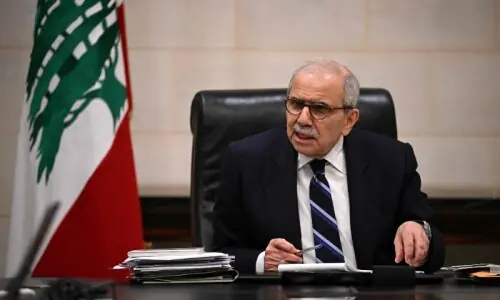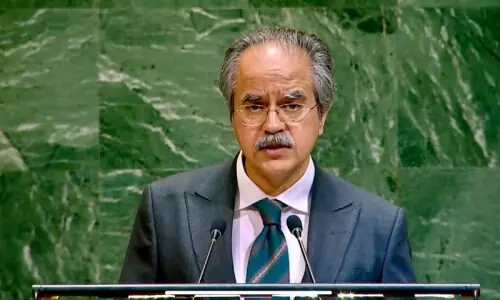BAGHDAD: Militants laid siege to Iraq's largest oil refinery Wednesday, threatening a facility key to the country's domestic supplies as part of their ongoing lightning offensive across the country, a top security official said.
He said fighters of the al Qaeda-inspired Islamic State of Iraq and the Levant began their attack on the Beiji refinery, some 250 kilometers north of the capital, Baghdad, late Tuesday night.
The attack continued into Wednesday morning, with fighters targeting it with mortar shells.
A small fire started on the facility periphery, he said.
The official spoke on condition of anonymity because he was not authorised to speak to journalists.
The Beiji refinery accounts for a little more than a quarter of the country's entire refining capacity, all of which goes toward domestic consumption for things like gasoline, cooking oil and fuel for power stations.
At the height of the insurgency from 2004 to late 2007, the Beiji refinery was under the control of Sunni militants who used to siphon off crude and petroleum products to finance their operations.
Any lengthy outage at Beiji risks long lines at the gas pump and electricity shortages, adding to the chaos already facing Iraq.
Farther north in the city of Tal Afar, fighting raged Wednesday between government troops and Islamic State fighters who captured the city on Monday, chief military spokesman Lt Gen Qassim al-Moussawi told The Associated Press.
He had no other details, but state television late on Tuesday aired footage of army troops and armed volunteers disembarking from a transport C-130 aircraft at an airstrip near Ta Afar.
Tal Afar is close to the Syria border and its capture strengthens the Islamic State's plan to carve out an “Islamic emirate” that covers territory on both sides of the territory.
The Sunni militants of the Islamic State have vowed to march to Baghdad and the Shia holy cities of Karbala and Najaf in the worst threat to Iraq's stability since US troops left.
The three cities are home to some of the most revered Shia shrines.
The Islamic State also has tried to capture Samarra north of Baghdad, home to another major Shia shrine.
Some 275 armed American forces are being positioned in and around Iraq to help secure US assets as President Barack Obama considers an array of options for combating the Islamic militants, including airstrikes or a contingent of special forces.
The White House has continued to emphasise that any military engagement remains contingent on the government in Baghdad enacting political reforms and ending sectarian tensions, which had been on the rise even before the Islamic State's incursion last week, with thousands killed since late last year.
Republicans have been critical of Obama's handling of Iraq, but Congress remains deeply divided over what steps the US can take militarily.
Even lawmakers who voted in 2002 to give President George W Bush the authority to use military force to oust Saddam Hussein have expressed doubts about the effectiveness of drone airstrikes and worry about Americans returning to the fight in a country split by sectarian violence.
“Where will it lead and will that be the beginning or the end?” Sen Richard Shelby, R-Ala., said, when asked about possible US airstrikes.
“We don't know that. This underlying conflict has been going on 1,500 years between the Shias and the Sunnis and their allies. And I think whatever we do, it's not going to go away. “
During the United States' eight-year presence in Iraq, American forces acted as a buffer between the two Islamic sects, albeit with limited success.
But US forces fully withdrew at the end of 2011 when Washington and Baghdad could not reach an agreement to extend the American military presence there.
Also Read: Iraq under watch of oil producers
Iraq has the world's fifth-largest known crude oil reserves, with an estimated 143 billion barrels, according to the US Energy Information Administration.
It produced some 2.58 million barrels of oil day in May, according to the Oil Ministry.
The price of oil eased slightly Tuesday after the US said it was deploying a small group of troops to Iraq, which helped soothe fears somewhat over the prospect of disruption to crude supplies.
The attack on Beiji likely will affect trading Wednesday.
Iran vows to defend Shia Holy sites in Iraq
Iran's president vowed on Wednesday to defend Shi'ite holy sites in Iraq.
Speaking on live television to a crowd, Iran's President Hassan Rouhani made the clearest declaration yet that Tehran was prepared to mobilise.
“Regarding the holy Shia shines in Karbala, Najaf, Kadhimiya and Samarra, we announce to the killers and terrorists that the big Iranian nation will not hesitate to protect holy shrines,” he said.
He said many people had signed up to go to Iraq to fight, although he also emphasised that Iraqis were prepared to defend themselves: “Thanks be to God, I'll tell the dear people of Iran that veterans and various forces - Sunnis Shias and Kurds all over Iraq - are ready for sacrifice.”
Millions of Shia pilgrims visit Iraq's holy sites each year.
Iraqi government forces are holding out against Sunni fighters in the city of Samarra north of Baghdad, site of one of the most important Shia shrines.
The Sunni fighters have vowed to carry their offensive south to Najaf and Kerbala, seats of Shia Islam since the Middle Ages.
Situation in Iraq shows signs of 'civil war': Saudi foreign minister
Saudi foreign minister Prince Saud al-Faisal said on Wednesday that the deteriorating security situation in Iraq shows signs of a “civil war”.
“This grave situation that is storming Iraq carries with it the signs of civil war whose implications for the region we cannot fathom,” he told a gathering of Arab and Muslim leaders in Jeddah.
The advance of Al Qaeda-linked militants stunned the Shi'ite-led government of Prime Minister Nouri al-Maliki last week, whose forces quit several northern Iraqi towns.



































